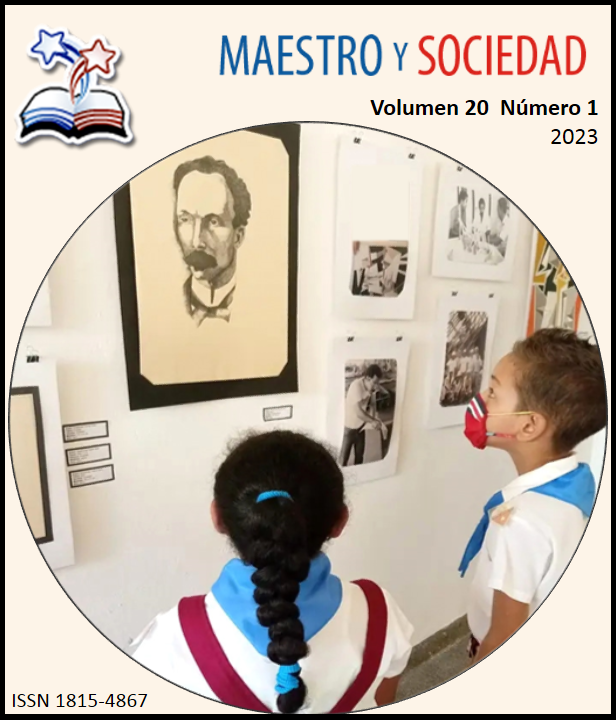Educational actions for school coexistence through physical activities in Guayaquil
Educational actions for school coexistence through physical activities in Guayaquil
Keywords:
school coexistence, physical activities, Ecuadorian educationAbstract
Introduction: The objective of the research was to propose educational actions through physical activities in an educational institution in the city of Guayaquil based on Kurt Lewin's theory to improve coexistence and school discipline in high school students.
Materials and methods: The methodology used is a quantitative approach of a proactive type with a non-experimental design. Other methods such as survey, documentary analysis were used.
Results: High school students have problems in terms of their coexistence and discipline, which is based on the results that more than half of the classroom have discipline difficulties as well as severe problems of coexistence and school discipline that has been evidenced by the problem that our high school students have and a minimum percentage of students who have an acceptable coexistence and discipline.
Discussion: Violence brings consequences of affectations in all citizens, especially in schoolchildren, in addition to interfering in learning processes at all levels, it affects life in democracy and harmonious coexistence.
Conclusions: The proposal is based on the Kurt Lewin Field Theory, who proposes group dynamics as well as shed great light on socio-educational inquiry, proposes group activities which work focused and motivated by the people who make up the team, where they can share fears, desires, interests in confidence to improve.
References
Arévalo Luna, E. (2017). Una visión iberoamericana de la convivencia escolar. Fondo Editorial Universidad Privada Antenor Orrego.
Cornejo, R. y Redondo, J. M. (2001). El clima escolar percibido por los alumnos de enseñanza media. Una investigación en algunos liceos de la Región Metropolitana. https://www.redalyc.org/pdf/195/19501501.pdf
García Blanc, Núria; Gomis, Raquel; Ros Morente, Agnès; Filella Guiu, Gemma. (2020) . El procesos de gestión emocional: investigación, aplicación y evaluación. Know and Share Psychology, 2020, 1(4), 39-49.
Lewin, K. (1942). La teoría del campo y el aprendizaje. En Conferencia ante la Sociedad Nacional para el Estudio de la Educación en los Estados Unidos de América. http://novahia.pbworks. com/f/4+Lewin%5B1% 5D.+La+teor%C3%ADa+del+campo+y+el+aprendizaje.pdf.
Mousalli-Kayat, G. (2015). Métodos y Diseños de Investigación Cuantitativa. https://www.researchgate.net/profile/Gloria-Mousalli/publication/303895876_Metodos_y_Disenos_de_Investigacion_Cuantitativa/links/575b200a08ae414b8e4677f3/Metodos-y-Disenos-de-Investigacion-Cuantitativa.pdf
Rodríguez, H. (2019). La convivencia escolar desde la perspectiva sociocultural. Universidad Autónoma de Aguascalientes.
Serey Araneda, D. (2019). Percepciones de los profesionales educativos sobre la Convivencia Escolar. Revista Educación Las Américas, 8, 35-47. https://doi.org/10.35811/rea.v8i0.4
Tovar, M. (2019). Convivencia Escolar: Punto de Convergencia para la Cultura de Paz en las Instituciones Educativas Venezolanas. Revista Cieg, 38, 150-162.
Valdés, R., López, V., & Chaparro, A. (2018). Convivencia escolar: adaptación y validación de un instrumento mexicano en Chile. Revista electrónica de investigación educativa, 20(3), 80-91.
Downloads
Published
How to Cite
Issue
Section
License
Copyright (c) 2023 Martha Beatriz Guzmán Rugel, Rita Amada Navarrete Ramírez

This work is licensed under a Creative Commons Attribution-NonCommercial-NoDerivatives 4.0 International License.
This journal provides immediate open access to its content, based on the principle that offering the public free access to research helps a greater global exchange of knowledge. Each author is responsible for the content of each of their articles.



























 Universidad de Oriente
Universidad de Oriente 